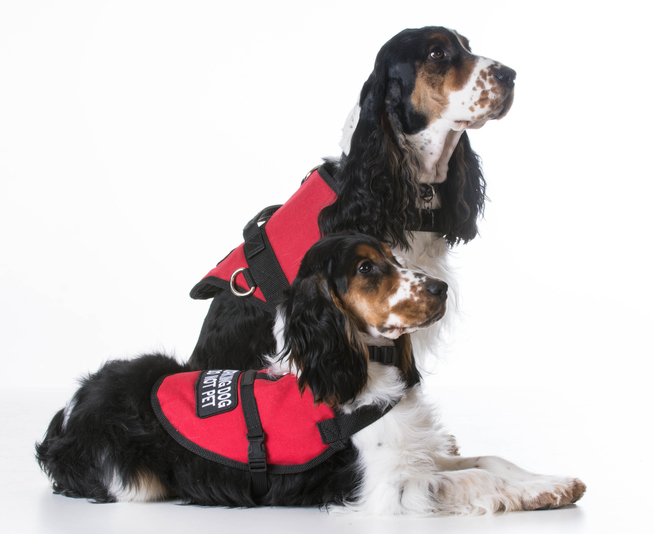When it comes to being in compliance with the Americans with Disabilities Act (ADA) regulations, franchisees should be aware of the rules surrounding service animals, which are defined as dogs that are individually trained to do work or perform tasks for people with disabilities. In general, title II (state and local government services) and title III (public accommodations and commercial facilities) must allow these animals access to places the general public is allowed to go.
Tasks that service animals are permitted to do include guiding people who are blind, alerting people who are deaf, pulling a wheelchair, alerting and protecting a person who is having a seizure, reminding a person with mental illness to take prescribed medications, calming a person with post-traumatic stress disorder during an anxiety attack or performing other duties.
For a dog to be considered a service animal, the service it has been trained to provide must be directly related to a person’s disability, and dogs whose sole function is to provide comfort or emotional support do not qualify as service animals under the ADA. Be aware that the definition of a service animal under the ADA may differ from the definition of a service or assistance animal under other laws such as the Fair Housing Act or the Air Carrier Access Act.
The ADA specifies that service animals must be harnessed, leashed or tethered, unless these devices interfere with the service animal’s work or the individual’s disability prevents using these devices. In that case, the individual must maintain control of the animal through voice, signal or other effective controls.
Employees at public facilities are only permitted to ask a person two questions regarding their service animal – is the service animal required because of a disability, and what work or task has the dog been trained to perform. Staff members cannot inquire about a person’s disability, require medical documentation, require a special identification card or training documentation for the dog, or ask that the dog demonstrate its task.
Fear and allergies are not reasons to prohibit the use of a service animal, and staffers at public facilities are not allowed to isolate a person with a service animal or ask them to take their animal off of the premises unless it is out of control or is not housebroken. Employees are also not allowed to charge fees for the presence of a service animal. If a business requires a deposit or fee to be paid by patrons with pets, it must waive the charge for service animals.
Under the ADA, establishments that sell or prepare food must still allow service animals in public areas even if state or local health codes prohibit animals on the premises, but employees are not required to provide care or food for an animal.
If an employee at a restaurant is in need of a service animal, that employee is still permitted to have the animal at work as long as the animal does not go in places designated for food preparation. Employers may not automatically reject a request to use a service animal and will be in violation of ADA compliance if they do. Employers must consider accommodations and/or the use of a service animal when they are requested, whether that’s during the interview process or a function of the job once someone has been hired.
A reasonable accommodation or use of a service animal can be requested by the employee, a health care provider, a relative, a friend or another representative acting on behalf of the employee and can be presented orally or in writing.
While an employer must consider and attempt to present a reasonable accommodation to the requesting party, the employer does not have to grant a reasonable accommodation if they can prove that such change would result in undue hardship. The ADA considers undue hardship to be any alteration that involves a significant difficulty or expense for the business, disrupts the business or would require the employer to change the basic nature of the business.
Employees using service animals must hold their animals to the same guidelines as patrons. The animals must be in control and housebroken, and employees must wash their hands for at least 20 seconds using soap, water and vigorous friction after handling their service animal.
In 2011, an ADA provision mandated that miniature horses be held to the same standards as dogs when it comes to complying with service animal regulations.

This information is provided courtesy of Elevanta partner – BB&T Insurance Services. Protect your business by contacting them today at servicenow@bbt.com or 888-399-2040.

